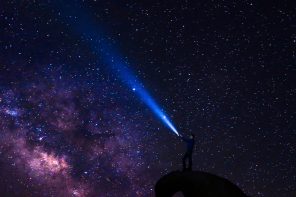‘What you doin’ with your life? Do you think about it?
Do you contemplate where we came from?’
So sings Lana Del Rey in the song ‘Sweet’ from her latest album Did You Know That There’s a Tunnel Under Ocean Blvd (2023). Since the release of her breakthrough album Born to Die (2012), Del Rey—who holds a BA in Philosophy from Fordham University—has often been described an ‘existentialist’ with her explorations and analyses of the human condition in her songs.1 However, there has been little philosophical discussion on how her music explicitly corresponds to specific existentialist thinkers, texts and themes. This short essay explores how some of the motifs in Del Rey’s work, such as the lyrical reflections quoted above from ‘Sweet’, resonate with ideas of the philosopher most associated with ‘existentialism’: namely, Jean-Paul Sartre (1905–1980).2
As Sartre observes in his great philosophical treatise Being and Nothingness (1943), ‘death has always been regarded as the final term of human life… Death reveals nothing other than ourselves.’3 Sartre’s analysis here draws on Martin Heidegger’s (1889–1976) famous notion of human existence as ‘being-towards-death’, which suggests death is a fundamental feature—and indeed terminus—of the human condition. ‘Death’, Heidegger writes in his magnum opus Being and Time (1927), ‘is a way of being which human existence takes over as soon as it is. As soon as the human being comes to life, she is at once old enough to die.’4 Or, as Del Rey sings in the title track of her aforementioned 2012 album: ‘we were [all] born to die’.
As though transposing the existentialist thesis that, by confronting the inevitability and the ‘nothingness’ of one’s own death or non-being human beings acquire an authentic mode of existence, Del Rey intimates that ‘it takes getting everything you ever wanted and then losing it to know what true freedom is’ in her prologue to the music video of ‘Ride’(2012):
In this prologue, Del Rey further says:
I was always an unusual girl… a chameleon soul: no moral compass pointing due north, no fixed personality, just an inner indecisiveness that was as wide and as wavering as the ocean. And if I said I didn’t plan for it to turn out this way I’d be lying. Because I was born to be the other woman: who belonged to no one; who belonged to everyone; who had nothing; who wanted everything; with a fire for every experience and an obsession for freedom that terrified me to the point that I couldn’t even talk about it. (emphasis added)
This supposed lack of any ‘moral compass’ or ‘fixed personality’ may seem to cohere with the popular impression of Sartre’s existentialism as a kind of moral nihilism. While this impression of Sartre is not strictly correct,5 the ‘obsession for freedom’ expressed in Del Rey’s prologue does echo aspects of Sartre’s philosophy of human consciousness and freedom.
It is well-known that Sartre holds that there is no human nature. As he states in his 1945 lecture Existentialism is a Humanism:
If man [sic] as existentialists conceive of him cannot be defined, it is because to begin with he is nothing. He will not be anything until later, and then he will be what he makes of himself. Thus, there is no human nature since there is no God to conceive of it. Man is not only that which he conceives himself to be, but that which he wills himself to be… man is nothing other than what he makes of himself. This is the first principle of existentialism.6
However, what is less well-known is that Sartre’s denial of a definitive, essential or created human nature and his insistence that the human being is ‘nothing’ is not simply because of his atheist rejection of the existence of a creator God who imputes a fixed nature and essence to the human creature, but it is informed also by his phenomenological analysis of the structures of human consciousness.7
In his magnum opus Being and Nothingness (1943), Sartre asserts that ‘There is nothing substantial about consciousness… it is total void (since the entire world is outside it),’ because ‘consciousness has no “content”.’8 Sartre’s point here is that human beings can know or be conscious of all sorts of things in the world because human consciousness has no intrinsic substantial ‘content’: it is because human consciousness is nothing that it is capable of knowing or desiring all things. Or in the language of Del Rey’s ‘Ride’ prologue, the human being is one who ‘ha[s] nothing’ but ‘want[s] everything’.9
In the epilogue of the ‘Ride’ music video, Del Rey further states:
On the open road, we had nothing to lose, nothing to gain, nothing we desired anymore, to make our lives into a work of art: Live fast, die young, be wild, and have fun. I believe in the country America used to be. I believe in the person I want to become. I believe in the freedom of the open road.
Turning ‘our lives into a work of art’ is another theme that we also find in Sartre’s existentialist exposition of the human condition.10 As Sartre states in Existentialism is a Humanism: ‘moral choice is like constructing a work of art… What art and morality have in common is creation and invention. We cannot decide a priori what ought to be done’, just as ‘there are no aesthetic values a priori, but there are values that will subsequently be reflected in the coherence of the painting, in the relationship between the will to create and the finished work. No one can say what tomorrow’s painting will look like; we cannot judge a painting until it is finished.’11
Like a painting or any ‘work of art’, we cannot determine or judge whether a (moral) life is well-lived or not until it is finished. One must not pre-determine or pre-judge the moral character of a particular human being according to some pre-defined criterion of ‘human nature’ (e.g., whether a particular human being conforms to some pre-defined picture of ‘human nature’ as white, male, able-bodied, etc.). Instead, one can only assess one’s life by how one actually lives it—by the kind of person one becomes—because, as Sartre argues, ‘man is constantly in the making’.12 Morality presupposes freedom: If we are not free, we cannot be held morally accountable for our actions and moral choices. To be an authentic moral agent, one must commit to taking responsibility of one’s own freedom and decisions. As Del Rey puts it, one must ‘believe in the person [one] want[s] to become’.
We cannot, however, just become whoever or whatever we want to be. We cannot, for instance, simply make ourselves become a bird who can fly (insofar as we are biologically conditioned and embodied as human beings) or easily become a billionaire like Elon Musk or Taylor Swift (insofar as we are also socially and economically conditioned and constrained). These different kinds of contingent constraints and conditions which limit our freedom are what Sartre calls ‘facticity’.13 For Sartre, freedom and facticity are ‘the twofold property of human being’: As contingent and situated beings, human beings are always caught between freedom and facticity.14 The human being is always ‘factically’ conditioned by the past, which constrains and limits her freedom, moral decisions and motivations:
‘Facticity’ and ‘the past’ are two words to refer to one and the same thing. In fact the Past, like Facticity, is… the inevitability of factual necessity: inevitable not qua necessity, but qua fact. It is the de facto being that cannot determine the content of my motivations, but whose contingency penetrates them, because they can neither remove it or change it… it is what they have to be, even as they try not to be it.15
It is perhaps no accident, then, that in her epilogue to the ‘Ride’ video, Del Rey places her assertion that ‘I believe in the person I want to become’ between her declaration of her belief in ‘the country America used to be’ and her belief in ‘the freedom of the open road’. For Sartre, the human being always finds oneself situated between facticity and freedom, existing in the present between the past which conditions us and the future possibilities which await us. Similarly, for Del Rey, our existence or indeed our becoming as human persons is always conditioned by our surroundings and our past but, at the same time, also free and open to the future and its possibilities.
In the chorus of ‘Ride’, Del Rey sings that ‘I’ve got a war in my mind’. This line is revisited later in the chorus of ‘Get Free’ (2017):
Sometimes it feels like I’ve got a war in my mind
I wanna get off but I keep riding the ride.
I never really noticed that I had to decide
to play someone’s game or live my own life.
Like Sartre before her, Del Rey here speaks of this as an intrinsic feature of human existence. There is an ongoing tension or ‘war’ between our facticity and freedom, between playing ‘someone’s game’ or living one’s ‘own life’. These two conditions—of our facticity and freedom, the past and the future, what Del Rey calls ‘someone’s game’ and one’s ‘own life’ or indeed ‘the country America used to be’ and ‘the freedom of the open road’—are not something we can evade but ‘two aspects of human reality’,16 which we must accept or even, as Del Rey says, ‘believe in’ if we are to exist authentically.17
For Sartre, to exist authentically does not mean, as some suppose, the expression or realization of some underlying ‘true self’ or human ‘nature’; rather, authentic existence involves the acceptance—and taking responsibility—of both one’s own freedom as well as the facticity that conditions such freedom.18 Similarly, for Del Rey, for one to exist authentically, one must accept or even—as she says—‘believe in’ the fact that one is both free and also constrained by various conditions of facticity, including the factical condition that one is inevitably bound to die or indeed born to die.
To accept or believe that one is bound or born to die in this way does not mean that one is to passively resign oneself to death as the inevitable end of one’s life. Instead, one is envisioned as living and existing more actively or even more ‘authentically’ in face of one’s being-towards-death. In such authentic existence, even if we are ‘troubled by [factical] circumstance’ of our inevitable death or if ‘life doesn’t always work out like we planned’, as Del Rey sings in ‘Dance Till We Die’ (2021), ‘we’ll keep walking on the sunny side and we won’t stop dancing till we die’. Put differently and more briefly, though we are factically all ‘Born to Die’, we must nonetheless try to exist authentically, live fast, and ‘Dance Till We Die’.
Del Rey’s articulation of authentic existence in terms of ‘Dance Till We Die’ can be traced back to her earlier song ‘Lust for Life’, the title track of her 2017 album of the same name: ‘We dance on the H of the Hollywood sign till we run out of breath, gotta dance till we die’ (emphasis added):
Two sentences are notably repeated throughout ‘Lust for Life’: ‘Take off, take off, take off all your clothes’ (the pre-chorus) and ‘And a lust for life keeps us alive’ (the chorus). Even in face of the inevitability or even the prospect that one might—as Del Rey sings in the pre-chorus—‘die young’, to exist authentically, one must embrace the ‘lust for life’ which not only ‘keeps us alive’ but also empowers us to live more actively, more freely, and ‘dance till we die’—or as Del Rey has it in ‘Candy Necklace’ (2023), ‘dancing like the young and reckless’.19
At first glance, it may seem odd that Del Rey says that one does this—that one attains some kind of authentic existence—by ‘taking off all of one’s clothes’. However, Del Rey’s call to ‘take off all your clothes’ may be understood as a figurative account of the phenomenological method of reduction: to suspend and bracket off one’s conceptual presuppositions and prejudices as much as one can in one’s analysis of phenomena and of one’s own experiences. In applying this method of reduction to his phenomenological analysis of the human condition,20 Sartre not only suggests that we must bracket any metaphysical assumptions and attend to the way in which human beings exist—focusing on human existence instead of human essence—he moreover argues that we must also not allow our social roles or positions (e.g., whether we are waiters, soldiers, students or otherwise) to determine or define who we are as human beings.21
Understood this way, Del Rey’s imperative ‘take off all your clothes’ may be interpreted as a figurative call for us to bracket off—or indeed take off—all the things which may define or essentialize who we are other than the fact that we exist, such as the clothes we wear (e.g., the uniforms worn by waiters, soldiers and students), in our consideration of the human condition.22 We are to suspend any preconceptions we may have about what it means to be human and focus instead on the way we live and exist in the world in which we find ourselves. It is by doing so, by accepting or even believing in our twofold freedom and facticity, that one exists authentically and become, in Del Rey’s words, ‘100 percent authentic’.23





